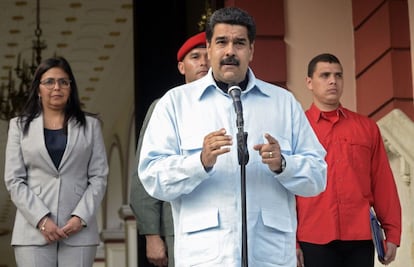Maduro vetoes amnesty that could see political prisoners freed from jail
Venezuelan president likely to take case to Supreme Court, where ‘chavista’ regime has good track record

A new conflict between the powers of government is brewing in Venezuela. The opposition-led National Assembly has approved the National Amnesty and Reconciliation Law, a measure that would see 78 political prisoners freed. But President Nicolás Maduro has said he will veto the bill, while chavista congressional leader Héctor Rodríguez said it would be “inapplicable because it violates Venezuelan and international laws.”
The Venezuelan Constitution allows the president the right to veto, offer observations and return the bill to parliament for revision and a subsequent vote – but there is a much more effective route available to him. He may also send it to the Supreme Court of Justice, where the Constitutional Court will decide whether the law violates the Constitution. According to a book by Antonio Canova, a Venezuelan lawyer, since the chavista regime increased the number of judges on the bench in 2004, it has not lost a single legal battle in that court.
The amnesty bill has revived the war the executive and legislative branches have waged against one another since the inauguration of this session of parliament
The amnesty bill has revived the war the executive and legislative branches have waged against one another since the inauguration of this session of parliament in January. Thus far, the opposition has lost every single fight. The administration has won not only because of the present constitution but also because the five justices on the Constitutional Court share the political values of the self-proclaimed Bolivarian Revolution.
Sign up to our newsletter!
The EL PAÍS English Edition is launching a weekly newsletter. Sign up today to receive a selection of our best stories in your inbox every Saturday morning. For full details about how to subscribe, click here.
Since January, the Supreme Court has blocked several legislative measures. Opposition leader Henry Ramos Allup tried to swear in three congressmen from the state of Amazonas (southern Venezuela) but the Maduro administration challenged their electoral victories. These three seats would have given the opposition groups, huddled together under the coalition known as Unity Roundtable, a two-thirds majority. But, the court blocked the investitures and the opposition chose not to get bogged down in a political quarrel over three votes. Amazonas remains without parliamentary representation, pending a decision from the Court.
The opposition then tried to revert the regime’s decision to push through the appointment of nine new Supreme Court justices at the very end of the last congressional session, just before it lost parliamentary majority. The court struck the measure down saying the National Assembly lacks the authority to “review, annul, revoke or not respect” the appointments made.
Despite its uncertain destiny, the new amnesty law has given some hope to the relatives of prisoners whom it might benefit. Lilian Tintori, the wife of political prisoner Leopoldo López, said: “It’s the beginning of the rescue of justice, reconciliation and freedom in Venezuela.” Chavistas beg to differ. “Amnesty is forgetting without reparations for the victims,” said congressman Pedro Carreño during the debate. President Maduro has denounced the law as a measure to “protect terrorists and criminals.”
President Maduro has denounced the law as a measure to “protect terrorists and criminals”
For its part, the opposition is trying to counter the view that the law is intended to protect those who were convicted of the 43 deaths that took place during the February 2014 demonstrations – led by López, former Congresswoman María Corina Machado and Caracas Mayor Antonio Ledezma – to urge the Maduro administration to resign.
Opposition leaders say the law would only apply to those accused of committing crimes during political demonstrations and individuals who have been unfairly convicted. Many of those who spoke during the bill’s presentation reminded their audience that Hugo Chávez became such an important leader because then-President Rafael Caldera pardoned him and his comrades-in-arms in 1994. The rest is history.
English version by Dyane Jean Francois.
Tu suscripción se está usando en otro dispositivo
¿Quieres añadir otro usuario a tu suscripción?
Si continúas leyendo en este dispositivo, no se podrá leer en el otro.
FlechaTu suscripción se está usando en otro dispositivo y solo puedes acceder a EL PAÍS desde un dispositivo a la vez.
Si quieres compartir tu cuenta, cambia tu suscripción a la modalidad Premium, así podrás añadir otro usuario. Cada uno accederá con su propia cuenta de email, lo que os permitirá personalizar vuestra experiencia en EL PAÍS.
¿Tienes una suscripción de empresa? Accede aquí para contratar más cuentas.
En el caso de no saber quién está usando tu cuenta, te recomendamos cambiar tu contraseña aquí.
Si decides continuar compartiendo tu cuenta, este mensaje se mostrará en tu dispositivo y en el de la otra persona que está usando tu cuenta de forma indefinida, afectando a tu experiencia de lectura. Puedes consultar aquí los términos y condiciones de la suscripción digital.








































